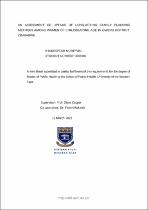| dc.contributor.advisor | Cooper, Diane | |
| dc.contributor.author | Mureyani, Shakespear | |
| dc.date.accessioned | 2022-03-23T08:04:13Z | |
| dc.date.available | 2022-03-23T08:04:13Z | |
| dc.date.issued | 2021 | |
| dc.identifier.uri | http://hdl.handle.net/11394/8964 | |
| dc.description | Master of Public Health - MPH | en_US |
| dc.description.abstract | The problem of the unmet need for contraception continues to affect contraceptive uptake particularly the use of long-acting reversible contraceptives. Globally, Sub-Saharan Africa is reported to have the highest unmet contraceptive need. For example, nearly 50 % of married women of reproductive age, wanting to avoid pregnancy or plan when to have children, are reportedly not using contraception. More specifically, the prevalence of contraceptive use, in the Midlands Province of Zimbabwe where the Gweru District is situated, is estimated to be only 11%. This study examined the uptake of and reasons for use of different types of modern contraceptives; the factors influencing contraceptive use; discontinuation of use and non-use and reasons thereof for contraception and for long-acting reversible contraception in particular, amongst women in the Gweru district attending contraceptive services. | en_US |
| dc.language.iso | en | en_US |
| dc.publisher | University of Western Cape | en_US |
| dc.subject | Unintended pregnancies | en_US |
| dc.subject | Contraceptive use | en_US |
| dc.subject | Women of child-bearing | en_US |
| dc.subject | Family planning | en_US |
| dc.subject | Gweru district | en_US |
| dc.title | An assessment of uptake of long-acting family planning methods among women of childbearing age in Gweru district, Zimbabwe | en_US |
| dc.rights.holder | University of Western Cape | en_US |

